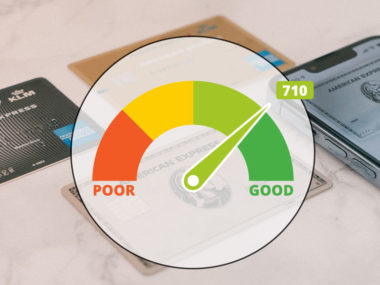According to credit reporting bureau Experian, a credit score of 530 officially ranks as “Very Poor.” It will likely mean a more difficult time finding approval for new loans, new credit cards, and new lines of credit, as borrowers have not yet satisfied the requirements for a “Good” credit score.
Understanding credit score — and the individual financial factors that contribute to credit score changes — can be confusing, but it’s important to overall fiscal health. A reflection of a borrower’s creditworthiness, your credit score is a reflection of your aptitude to repay a loan once it has been issued by a lender.
One of the first steps to improving a credit score of 530 is familiarizing yourself with recent changes in ranking.
No matter their credit score, many borrowers trust free, safe-for-use credit reporting programs like AnnualCreditReport.com, for constant access to credit score status updates and information on potential reasons for any new increases or decreases.
Table of Contents
Why Your Credit Score Is 530
While it is not possible to identify the exact reasons for a credit score of 530, influences on lesser credit scores often include inconsistent payment history, immature credit age, and excessive hard inquiries.
Inconsistent Payment History
Accounting for 35% of the equation that determines a borrower’s credit score, payment history is an important factor in deciding credit ranking. Borrowers who make full, on-time payments can experience increased credit scores over time; conversely, missed payments can derail credit scores, and make future improvement more difficult.
Individuals with credit scores of 530 likely maintain an inconsistent payment history, where partial or late payments could be keeping you from increases to your Very Poor credit score.
Improving your payment history — and therefore your credit score of 530 — is easy in theory, and often difficult in application.
Borrowers need to begin making complete payments before repayment deadlines pass, to establish a more positive payment history over time.
This often requires adopting more disciplined spending habits, where consumers avoid unnecessary purchases and impulse-based transactions, reserving sufficient portions of monthly wages specifically for credit repayments.
Immature Credit Age
Credit age is another important factor in determining your overall credit score. A reflection of the average age of all lines of credit, credit age often maintains a positive relationship with credit score: the more mature the credit age, the higher the chance for credit score improvements.
Individuals with a credit score of 530 are not likely to see positive credit score increases as a result of credit age. Rather, borrowers with Very Poor credit scores likely use credit accounts that are still relatively young, not capable of positively affecting their overall credit score.
In addition, your overall credit age could be compromised by regularly added new lines of credit, which would prevent your overall credit age from maturing.
Excessive Hard Inquiries
Any time a lender officially considers a borrower for a new loan or line of credit, a hard inquiry is performed — a standard check into a consumer’s financial history. Hard inquiries can remain in an individual’s financial history for up to one year, and excessive hard inquiries will serve as red flags to future lenders.
A credit score of 530 is often accompanied by excessive hard inquiries, as borrowers frequently pursue new lines of credit to satisfy old debts. More hard inquiries will make lenders less likely to issue new loans since borrowers already have several monthly loans to satisfy.
What Can You Do With a 530 Credit Score?
Options to acquire new loans and new credit cards are extremely limited for borrowers with a credit score of 530. Issues like excessive hard inquiries and bankruptcy have potentially compromised your ability to secure new lines of credit when you need them.
Once you improve your credit score, you are more likely to qualify for financial opportunities like mortgage loans, rewards-based credit cards, and personal loans.
- Personal loans help consumers address personal financial projects, everything from a destination honeymoon to an unexpected medical expense.
- While individuals with 530 credit scores aren’t likely to qualify for a personal loan from a reputed lender, personal loans optimized for poor credit scores might be an option for you.
- The best rewards-based credit cards might become an option for you once your credit score of 530 sees necessary improvements.
A credit score of 530 means that the top credit cards and lowest insurance rates are unrealistic at the moment. While further credit ranking increases are necessary before you can secure these benefits, loans from lenders who accept poor credit scores can still help you obtain some of the financing you need, when you need it.
How to Repair a 530 Credit Score
A 530 credit score is often negatively affected by some of the more serious threats to credit ranking, including bankruptcy, loans in default, and repayments due to collections agencies.
Addressing these concerns first — and prioritizing immediately due balances and payments with especially high interest rates — will help you begin to establish a more firm foundation for eventual credit score improvements.
If you notice any inaccuracies in your credit report, trusting one of the best credit repair agencies is often the quickest way to seek a resolution. Credit repair companies can help you rectify your credit score, and will even communicate with lenders and credit companies on your behalf.
Successful credit repair will remove any errors in your financial report currently affecting your credit score, and can serve as the first step toward establishing a solid credit score in months to come.
Image Source: https://depositphotos.com/





